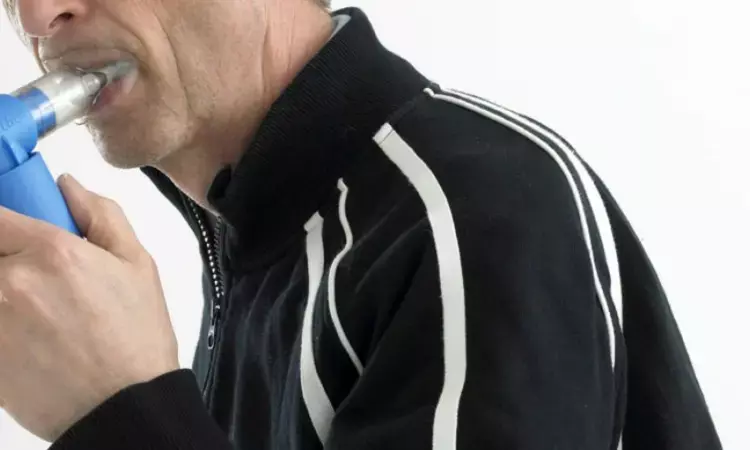- Home
- Medical news & Guidelines
- Anesthesiology
- Cardiology and CTVS
- Critical Care
- Dentistry
- Dermatology
- Diabetes and Endocrinology
- ENT
- Gastroenterology
- Medicine
- Nephrology
- Neurology
- Obstretics-Gynaecology
- Oncology
- Ophthalmology
- Orthopaedics
- Pediatrics-Neonatology
- Psychiatry
- Pulmonology
- Radiology
- Surgery
- Urology
- Laboratory Medicine
- Diet
- Nursing
- Paramedical
- Physiotherapy
- Health news
- Fact Check
- Bone Health Fact Check
- Brain Health Fact Check
- Cancer Related Fact Check
- Child Care Fact Check
- Dental and oral health fact check
- Diabetes and metabolic health fact check
- Diet and Nutrition Fact Check
- Eye and ENT Care Fact Check
- Fitness fact check
- Gut health fact check
- Heart health fact check
- Kidney health fact check
- Medical education fact check
- Men's health fact check
- Respiratory fact check
- Skin and hair care fact check
- Vaccine and Immunization fact check
- Women's health fact check
- AYUSH
- State News
- Andaman and Nicobar Islands
- Andhra Pradesh
- Arunachal Pradesh
- Assam
- Bihar
- Chandigarh
- Chattisgarh
- Dadra and Nagar Haveli
- Daman and Diu
- Delhi
- Goa
- Gujarat
- Haryana
- Himachal Pradesh
- Jammu & Kashmir
- Jharkhand
- Karnataka
- Kerala
- Ladakh
- Lakshadweep
- Madhya Pradesh
- Maharashtra
- Manipur
- Meghalaya
- Mizoram
- Nagaland
- Odisha
- Puducherry
- Punjab
- Rajasthan
- Sikkim
- Tamil Nadu
- Telangana
- Tripura
- Uttar Pradesh
- Uttrakhand
- West Bengal
- Medical Education
- Industry
Different inspiratory muscle training protocols safe and effective in cardiopulmonary rehabilitation of CKD patients: Study

Turkey: In a groundbreaking endeavor to enhance the quality of life for patients with chronic kidney disease (CKD), researchers have conducted a randomized study to investigate the effects of various inspiratory muscle training protocols on functional exercise capacity and respiratory and peripheral muscle strength. The study's findings offer valuable insights into novel strategies for improving the physical well-being of individuals battling CKD.
Published in BMC Nephrology, the study found that inspiratory muscle training (IMT) with %30 could be an option for patients with CKD who do not tolerate higher intensities.
"IMT with 30% and 60% maximal inspiratory pressure (MIP) similarly improves inspiratory muscle strength and functional exercise capacity," the researchers reported. "IMT with 30% is more effective in increasing physical activity (PA)." IMT enhances peripheral and expiratory muscle strength, QoL and balance, and respiratory function and reduces fatigue and dyspnoea.
Due to abnormal renal function in CKD, pathological changes were observed in the diaphragm. Inspiratory muscle training has been suggested for CKD patients; however, the most appropriate intensity for IMT has not been determined.
Therefore, Nihan Katayıfçı, Hatay Mustafa Kemal University, Hatay, Turkey, and colleagues aimed to investigate the effects of different IMT protocols on respiratory muscle strength, handgrip muscle strength (HGS), quadriceps femoris muscle strength (QMS), functional exercise capacity, pulmonary function, quality of life (QoL), fatigue, dyspnoea, balance, and physical activity (PA) levels in CKD patients.
For this purpose, the researchers conducted a randomized, controlled, single-blind study comprising 47 patients. They were divided into three groups: Group 1 (n = 15, IMT with 10% maximal inspiratory pressure (MIP)), Group 2 (n = 16, IMT with 30% MIP), and Group 3(n = 16; IMT with 60% MIP). 6-min walking test (6-MWT), maximal expiratory pressure (MEP), MIP, pulmonary function, QoL, HGS, QMS, fatigue, dyspnoea, balance, and PA levels were assessed before and after eight weeks of IMT.
The following were the key findings of the study:
· Increases in MIP, %MIP, 6-MWT distance, and %6-MWT were significantly higher in Groups 2 and 3 than in Group 1 after IMT.
· MEP, %MEP, FEF25-75%, QMS, HGS, and QoL significantly increased; dyspnoea and fatigue decreased in all groups.
· FVC, PEF, and PA improved only in Group 2, and balance improved in Groups 1 and 2.
In summary, IMT should be used safely in patients with CKD, and IMT with %30 could be an option for CKD patients who do not tolerate higher intensities.
"IMT with 30% or 60% should be an effective and safe intervention in cardiopulmonary rehabilitation for patients with CKD not on dialysis," the research team wrote.
"There is a need to investigate the effects of IMT on the abovementioned outcomes in different CKD stages," they concluded.
Reference:
Katayıfçı, N., Hüzmeli̇, İ., İri̇ş, D. et al. Effects of different inspiratory muscle training protocols on functional exercise capacity and respiratory and peripheral muscle strength in patients with chronic kidney disease: a randomized study. BMC Nephrol 25, 184 (2024). https://doi.org/10.1186/s12882-024-03610-1
Dr Kamal Kant Kohli-MBBS, DTCD- a chest specialist with more than 30 years of practice and a flair for writing clinical articles, Dr Kamal Kant Kohli joined Medical Dialogues as a Chief Editor of Medical News. Besides writing articles, as an editor, he proofreads and verifies all the medical content published on Medical Dialogues including those coming from journals, studies,medical conferences,guidelines etc. Email: drkohli@medicaldialogues.in. Contact no. 011-43720751


